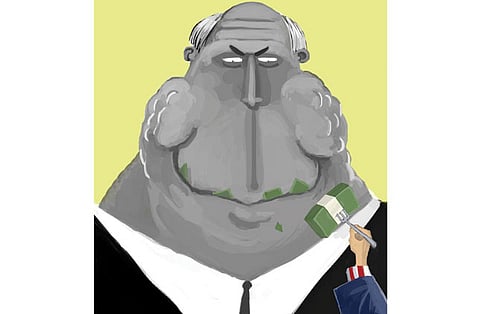US banks ignore Europe’s lesson on greed
Four years after Lehman Brothers, we are starting to see a few glimmers of hope

Four years after the collapse of Lehman Brothers Holdings Inc. and the near-total paralysis of capitalism’s central nervous system — the moment fear completely overwhelmed greed on Wall Street — we are starting to see a few glimmers of hope.
The good news: Several big banks have finally started taking steps to reform Wall Street’s out-of-control compensation system, which rewards bankers and traders with big bonuses for taking insane risks with other people’s money. The bad news: These banks are in Europe, and most of their US cousins still just don’t get it.
UBS, for its part, said it is considering capping banker and trader bonuses and making them a function of the executives’ fixed salaries or of the bank’s profitability. UBS also said it was examining a five-year vesting option for stock awards, along the line of Deutsche Bank’s proposal. Credit Suisse Group AG and HSBC Holdings PLC have also taken baby steps in the direction of compensation reform.
In the US, though, there has been virtual silence on the topic. Bankers and traders on Wall Street still get rewarded with big bonuses solely based upon the revenue they generate from the products they sell. Just as before the financial crisis and unlike almost every other business on Earth, about 50 per cent of every dollar of revenue generated on Wall Street goes right back out the door in the form of compensation. Not surprisingly, this absurd compensation system encourages bankers and traders to keep selling and trading, giving very little thought to the consequences on the rest of us for the products they sell or the big trading bets they make. As for accountability, forget it.
Worse, neither Lloyd Blankfein, the chief executive officer of Goldman Sachs Group Inc., or Jamie Dimon, his counterpart at JPMorgan Chase & Co. — Wall Street’s highest-profile leaders — have said anything about changing this flawed system, while continuing to be paid tens of millions in annual compensation. Instead, Goldman cut corners by eliminating its two-year analyst program for college seniors. This is not leadership.
To his credit, James Gorman, the CEO of Morgan Stanley, has at least addressed the flawed Wall Street compensation system: In 2011, Morgan Stanley’s bankers and traders had their cash bonuses capped at $125,000. Gorman said publicly, at the World Economic Forum in January, if they didn’t like it, they could just leave. Few have, and why would they? Where else but Wall Street can they get paid so much for risking none of their own money?
Look at the recent past. Who could forget JPMorgan Chase’s London Whale debacle, where close to $6 billion (Dh22.03 billion)was lost by the unit that invests surplus deposits in an ill-advised, obscure proprietary bet on the direction of interest rates? (The bank points out that no depositor will end up losing money.) Or the devastating loss of confidence in the markets caused by the big banks’ manipulation of the London interbank offered rate? Or HSBC’s money-laundering scandal? Or Standard Chartered PLC’s bookkeeping shenanigans to help Iran? Or Nomura Holding Inc.’s insider-trading scandal? These happened after the financial crisis laid bare a Wall Street culture that more closely resembled La Cosa Nostra than anything else.
Why has there been so little change, even though individual bankers, traders and executives seem to be falling over themselves in recent days to sort of accept blame for what went wrong? (The most recent example came from Anshu Jain, one of two new leaders of Deutsche Bank, who laid out a plan for an internal change of culture with the admission that “tremendous mistakes have been made. We can see times have changed and we need to change and change rapidly.”)
Part of the answer, perhaps, is that Wall Street behavior merely reflects the latest acceptable norms in society as a whole, which sadly has seen a steady decline in ethics, morality, compliance and leadership in the last generation.
Wall Street has taught Main Street the wonders of stock options and “golden parachutes” and excessive executive compensation, among other things, all of which are designed to enrich the few at the top with a minimal amount of accountability for their behavior.
We have also been inundated in the last year - thanks to Mitt Romney’s presidential quest - with the facts of just how easy it is for private-equity and hedge-fund moguls to make fortunes using other people’s money while minimizing the amount of taxes they pay. It’s great work if you can get it. But it all adds up to a steady stream of messages that amount to, paraphrasing the actor Michael Douglas: Greed is Good.
If the financial crisis and its aftermath have taught us anything, though, it is that greed is not always good. Not even close. If I were a Wall Street CEO, hauling in tens of millions of dollars a year, I would be embarrassed to call myself a leader while perpetuating a compensation system that continues to reward bad behavior at my firm. Until Wall Street’s leaders again have their full net worth on the line every day - as they did two generations ago when Wall Street was a series of small, private partnerships - the idea of real change on Wall Street remains a joke.
— William D. Cohan, the author of “Money and Power: How Goldman Sachs Came to Rule the World,” is a Bloomberg View columnist. He was formerly an investment banker at Lazard Freres, Merrill Lynch and JPMorgan Chase, against which he lost an arbitration case over his dismissal. The opinions expressed are his own.



